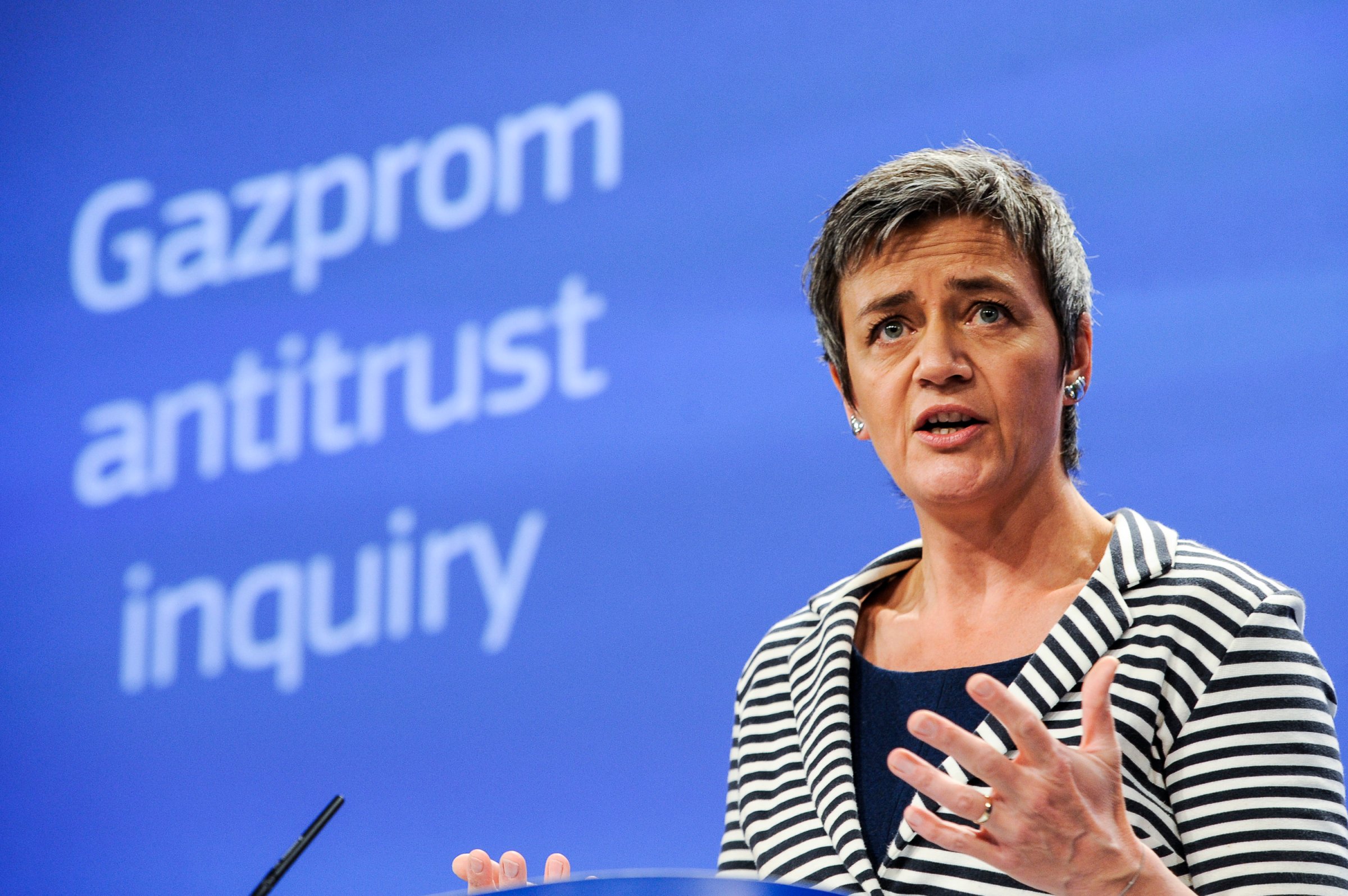
Europe’s top antitrust regulator wants you to know she isn’t afraid. Only a week after accusing Google Inc. of abusive behavior, she’s now taking aim at another mean 800-pound-gorilla of an altogether different kind.
Competition Commissioner Margarethe Vestager formally sent a “statement of objections” to Russian gas giant OAO Gazprom Wednesday, saying it had used unfair pricing policies to stop competition in five countries in central and eastern Europe.
The case promises to be a defining moment in Europe’s evolving relations with Russia, a new source of friction to add to the problems of mutual sanctions related to Russia’s annexation of Crimea and its support for separatist rebels in eastern Ukraine.
Vestager tried to play down the political dimensions of the case at her press conference Wednesday, pointing out that the Commission has often undertaken similar action to crack down on similar abuse by state-owned companies in member states like France and Italy.
But there’s no glossing over the fundamental ideological gap between the two sides: Russia, and before it the Soviet Union, believes that in gas, security of supply is paramount, and than a monopoly is the best way of delivering that security. The E.U., whose member states used to agree with that policy back in the Cold War, has for the last 30 years insisted that consumers are best served by competition instead.
The case boils down to one old gripe and one new one: the old one is the ‘destination clauses’ in Gazprom’s contracts that forbid companies in one country from reselling its gas in another member state. This combines with Gazprom’s traditional price formula, which is linked to the price of oil with a time-lag. This often leaves Gazprom’s prices out of sync with spot prices. The mismatch can work against the Russians as well as for them, but the Commission argues that the formula “unduly favors” Gazprom.
“Gazprom has been able to charge higher prices in some countries, knowing that gas wouldn’t flow in from other countries,” Vestager explained.
The Commission’s newer gripe is that Gazprom has been using its position as a dominant supplier of gas in eastern Europe, a legacy of the USSR’s position as gas supplier to its Comecon satellites. Gazprom’s market share in eastern Europe can be anything between 51% and 100%). Vestager said the company had bullied those countries into not building infrastructure that would let them accept competing gas. That particular row led to Gazprom cancelling in December the construction of “South Stream”, a new pipeline under the Black Sea that would have fed south-eastern and central Europe for years.
The stakes are enormous: the E.U.’s gas supply (24% of total supply) depends on Gazprom, and the degree of dependence increases the further east you go. If Gazprom carries out a threat to stop piping gas to Europe through Ukraine in 2018, the Balkans will struggle to find alternative sources.
But Russia’s budget also depends on Gazprom–20% of all budget revenue comes from the company, and most of that comes from its legally-enshrined export monopoly of piped gas. In a year when Russia’s economy is set to shrink by nearly 4%, the need for those gas dollars is especially pressing.
For those reasons, the two sides have soft-pedaled the issue for 20 years. Although the Commission has had all the information it needed for over a year, it has held off until now from launching the case, for fear (many suspect) of fanning the flames of the Ukrainian crisis. Even now, Vestager’s case, focusing on the Baltic States, Poland and Bulgaria, is only a slimmed down version of what it could have been.
Gazprom stopped short of saying that the case against it was politicized Wednesday, but did say it was “unfounded”. By the same token, Vestager avoided accusing Russia of using Gazprom’s preferential pricing as a foreign policy lever, although it’s what everyone in Europe thinks.
The irony of the case is that the failure of Russia, the E.U. and the two key transit countries of Belarus and Ukraine to settle their differences amicably has led to billions of dollars being wasted on surplus infrastructure. Neither the Russian pipelines under the Baltic and Black Seas, built out of spite for the transit countries, nor the LNG terminals being built in Poland and Lithuania to spite Gazprom, should have any place in an efficient market.
Gazprom has 12 weeks to respond to the E.U.’s statement. If the charges stick, then it could face a fine of up to 10% of its global revenue, although few expect anything that extreme, due to the political sensitivity of the case.
More Must-Reads from TIME
- Cybersecurity Experts Are Sounding the Alarm on DOGE
- Meet the 2025 Women of the Year
- The Harsh Truth About Disability Inclusion
- Why Do More Young Adults Have Cancer?
- Colman Domingo Leads With Radical Love
- How to Get Better at Doing Things Alone
- Michelle Zauner Stares Down the Darkness
Contact us at letters@time.com